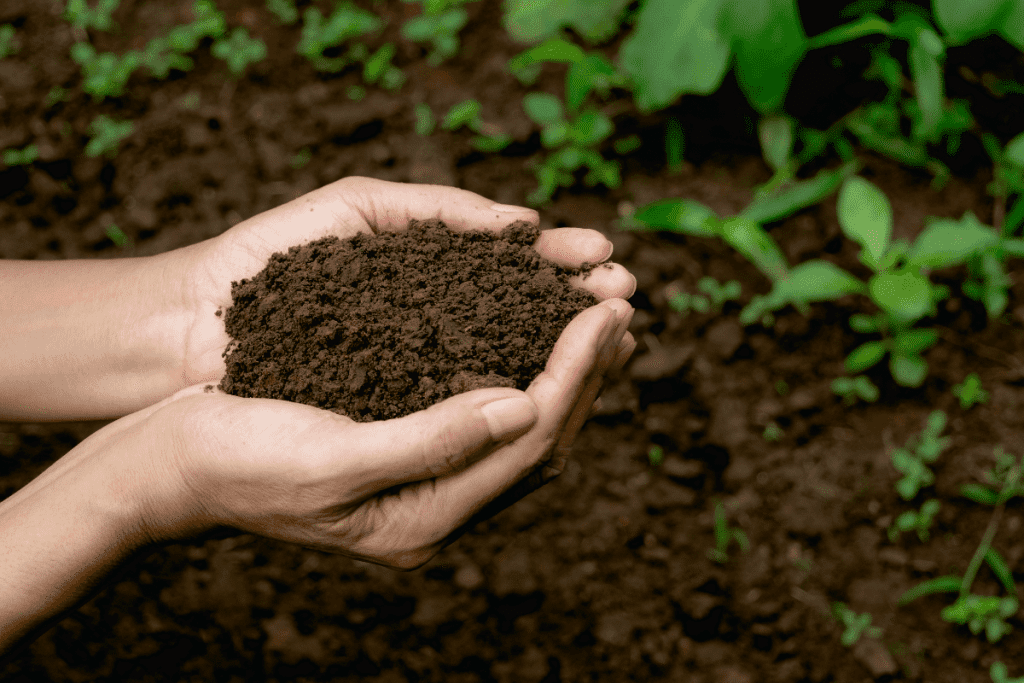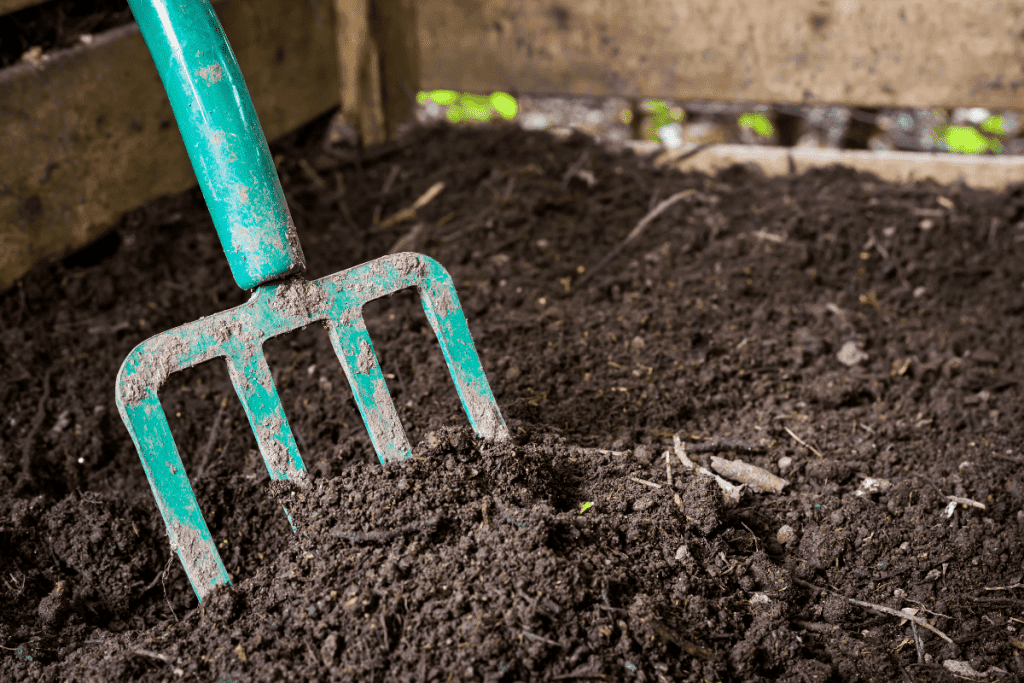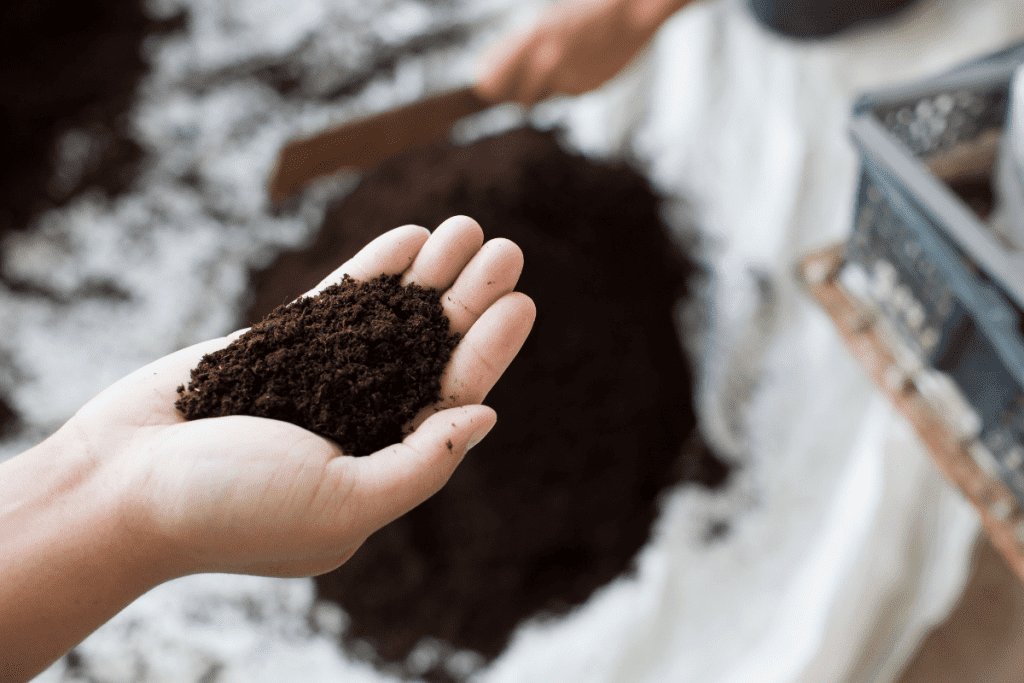If you have a lawn or garden, you will need a high-quality fertilizer to keep your plants healthy.
Compost is mixed with soil to encourage plant growth by adding nutrients, maintaining moisture content, and keeping pests and diseases away.
Vegetable plants, ornamental flowering plants, and grass will all benefit from the addition of compost.
Compost contains beneficial bacteria to decompose organic matter and enrich the soil without adding any potentially harmful chemicals to the environment.
Compost also has a small carbon footprint and reduces landfill methane emissions.
You may create your compost if you have the space in the yard, but there are several bagged composts available on the market.
With so many options out there, we decided to look at 13 of our favorites.

Table of Contents
Worm Castings Soil Builder
Brut Worm Farms Worm Castings Soil Builder is manufactured to work for both gardens and lawns.
The company is family-owned, and it is based in Minnesota.
This compost improves the flow of nutrients and adds long-term nourishment to your soil.
Several beneficial microbes and bacteria in the worm castings, which keep your plants healthy and stable.
The compost comes in a 30-pound bag for ease of use, and every bag is guaranteed to be less than one week old.
The compost consists of high-quality earthworm castings, suitable for use with indoor or outdoor plants.
It is also non-toxic and odor-free, and because it is not outsourced, it does not contain filler materials such as sand or sticks.
Pros:
- Small bag, easy to use.
- Non-toxic and odor-free.
- No filler.
- Fresh product.
Cons:
- A bit pricey.
- It may be too moist for some users.
Earth 803
Dr. Earth 803 is excellent compost for flower and vegetable gardens, but it also works well when used on lawns, shrubs, and food crops.
When mixed with soil, it creates the best conditions for optimal plant growth and health.
This compost is made in the United States and consists of green-fed earthworm castings, valley-grown alfalfa meal, cold water kelp meal, and other organic nutrients.
This compost also helps break down clay and gives the soil a softer texture.
The compost is hand-made, organic, and 100% natural materials.
Pros:
- Made from 100% natural organic materials.
- No odor.
- It helps the soil retain moisture.
Cons:
- Expensive when compared to other brands.
- It may contain small stones.
Michigan Peat Garden Magic Compost and Manure
Michigan Peat Garden Magic is an odor-free organic compost consisting of blended natural organic reed sedge peat and composted animal manure.
The natural nutrient content of this compost is ideal for improving a variety of soils and works well on your lawn or garden.
This compost has a smooth texture and dark color with no odor.
It comes in a 40-pound bag and costs less than other bagged compost brands.
This compost also does well in retaining moisture in the soil.
Pros:
- Odor-free and rich in natural nutrients.
- It has a smooth texture.
- Excellent at retaining soil moisture.
- Less expensive than other compost brands.
Cons:
- It comes in a large bag.
- It may contain small twigs.
Charlie’s Bagged Compost
Charlie’s Bagged Compost consists mainly of chicken manure and is certified organic by the Kentucky Department of Agriculture.
It improves the nutrient content of the soil and adds antibacterial properties.
It is an excellent choice for flower and vegetable gardens.
This compost will improve soil structure, water retention and is OMRI approved for sustainable use.
The compost is completely safe to use, and it mixes well with other organic fertilizers.
It is important to follow the application instructions on the bag, as this compost tends to burn plants if it is overused.
Pros:
- It comes in a small, 10-pound bag for easy handling.
- Easy to use.
- Excellent at repelling bugs.
Cons:
- Expensive for how much is in the bag.
- It will burn your plants if used improperly.
Jobe’s Organics Compost Starter Granules
Jobe’s Organics Compost Starter Granules are formulated to be added to the soil or compost pile to facilitate the natural composting process.
This compost starter is one of the few fast-acting organic products with noticeable results.
It has been OMRI certified for organic gardening.
The compost starter is composed of bacteria, mycorrhizal fungi, and a unique species of Archaea.
These micro-organisms rapidly break down complex organic materials into essential nutrients readily absorbed by plants.
Add two cups of this compost starter to one cubic yard of organic waste, resulting in as little as 2-3 weeks.
Pros:
- Guaranteed results.
- No odor.
- It is made with 100% natural nutrients.
- It comes in a small bag for easy use.
Cons:
- Difficult to find unless you order it online.
Espoma Organic Traditions Compost Starter
Espoma Organic Traditions Compost Starter helps to break down hard to compost materials.
This compost starter is made in the United States from bio-organic microbes.
The family-owned company has been in business for over 90 years.
This compost starter is excellent for vegetable gardens due to its ability to quickly break down organic material into usable nutrients for the plants.
It comes in a small bag, but it only takes one cup of the compost starter to cover 16′ square feet of organic material.
This compost starter mainly consists of nitrogen, containing phosphate, potash, calcium, magnesium, and sulfur.
Because of its all-natural formula, this compost starter is safe for pets and humans.
Pros:
- It works quickly.
- Organic and full of nutrients.
- It improves soil quality.
Cons:
- Strong odor.
- Very small bags.
- Expensive compared to other brands.
Wakefield Hero Blend Bagged Compost

Wakefield Hero Blend Compost is made from a blend of biochar, organic compost, and mycorrhizal fungi to encourage healthy plant growth.
This compost encourages micro-organisms, microbial activity, nitrogen, and other nutrients to absorb the soil.
The compost also helps with water retention in the soil, and it is safe for the environment because it does not contain harsh chemicals.
The 20% biochar content of this compost naturally increases microbial activity in the soil.
This microbial activity is a long-term solution to improving your soil, and it increases the soil’s ability to supply nutrients to your plants.
Pros:
- Made from organic material.
- Long-term soil improvement.
- Safe for the environment.
Cons:
- The bag is extremely heavy, so it may be challenging to use.
Purple Cow Organics Bagged Compost
Purple Cow Organics Compost has a variety of uses, from replenishing garden beds, improving soil, and repairing lawns.
This compost also works well with trees, shrubs, and potted plants.
The compost puts microbes, trace minerals, and other vital nutrients into the soil to encourage healthy plant growth.
This compost does not contain manure, and it is regularly tested for biological content and nutrient levels.
It is also OMRI certified as organic and includes a proprietary mineral complex with sea and rock minerals and worm castings.
Pros:
- It is a versatile product.
- It improves soil structure.
- It encourages strong root growth.
- OMRI certified organic.
Cons:
- Expensive when compared to other brands.
- It may be difficult to find due to its popularity.
Wiggle Worm Soil Builder
Wiggle Worm Soil Builder is another organic compost made entirely from worm castings.
This user-friendly compost works well with vegetable or flower gardens and houseplants.
It only takes a small amount of this compost to improve the soil.
This compost is formulated with fast-acting nutrients for quick absorption and slow-release nutrients to feed the plants for an extended period.
The compost improves soil structure by providing natural aeration.
This aeration encourages stronger root growth and water drainage in the soil.
This compost also will not burn your plants.
Pros:
- Completely organic.
- Requires only a small amount to be effective.
- It will not burn your plant.
- Odor-free.
Cons:
- Some users have reported bugs in the bag.
Soil Blend Super Compost
Soil Blend Super Compost contains mycorrhizal fungi to encourage strong root growth.
This compost is certified organic and GMO-free.
The compost also works very well for flower and vegetable gardens and is approved and recommended by the American Vegetarian Association.
This compost is made from composted cow manure, alfalfa meal, and earthworm castings.
The compost has a 2-2-2 NPK ratio and includes sulfur, magnesium, calcium, and iron.
Super Compost is also odorless and will not burn your plants.
Each bag of this concentrated compost is weighed and blended by hand.
Pros:
- Certified organic.
- GMO-free.
- Odorless.
- Will not burn your plants.
Cons:
- Very expensive for the amount you get.
Gardener’s Gold Premium Compost
Gardener’s Gold Premium Compost is organic, and it will improve the quality of your soil.
There is no animal manure in this compost, and it is made entirely from plant materials.
The plant materials in this compost include grass clippings, wood chips, shredded paper, and straw.
This compost is suitable for usage in flower and vegetable gardens and grass.
This is a slow-release compost, and it may be applied in the spring and fall seasons.
Gardener’s Gold also helps the soil retain moisture and suppresses weed growth, which is especially helpful to your lawn.
Pros:
- Completely organic.
- Low odor.
- It is a versatile compost.
Cons:
- More expensive than other brands.
Blue Ribbon Organics OMRI Certified Organic Compost
Blue Ribbon Organics Compost is an excellent choice for a large garden because you get 35 pounds per bag.
The compost may be added to your soil at any time, and it will not burn your plants.
This compost is also OMRI-certified organic, and it does not contain any manure.
It is made from composted vegetables, grass clippings, and other organic materials to make your plants grow vibrant and healthy.
The compost will also improve the soil structure, providing plants with better soil to grow strong roots.
Pros:
- OMRI certified.
- Will not burn your plants in any concentration.
- Improves soil structure
Cons:
- High price.
Wakefield Biochar Premium Compost
Wakefield Biochar Premium Compost is an aged compost, and it will significantly improve the quality of your soil.
This product is considered a soil amendment, so while it will improve soil structure, it may not help your plants grow quickly.
It may be used as a topdressing for an established lawn, as a base for sod, or mixed into soil for a vegetable garden.
The compost is OMRI certified organic, has no odor, and is safe for people and pets.
Pros:
- OMRI certified as organic.
- It improves soil structure.
- It allows for better water retention.
- No odor.
- Safe for people and pets.
Cons:
- It does not dramatically increase plant growth.
The Three Most Common Types of Compost

Peat Moss
This compost is made from a peat moss base and combined with sand, fertilizer, or grit.
A peat-free compost will be made from bark, coir, wood fiber, or green compost.
Organic
An organic compost does not have any chemicals, and it is made from a mix of wood fibers, composted bark, and other organic materials.
Organic compost is usually enriched with all-natural nutrients, and it may be certified as organic.
Multi-Purpose
A multi-purpose compost may be used on your lawn or garden and includes container plants.
There are several different blends of this type of compost, so be sure to read the label to find one matching your needs.
How To Choose The Best Bagged Compost
The compost you choose depends on which types of plants you are growing.
It is wise to have a soil test performed on your lawn or garden to determine which nutrients your soil may be lacking.
If you are sowing seeds, you will need compost that provides the necessary nutrients for seed development and promotes healthy root growth.
Buying bagged compost is excellent for beginner gardeners because it is formulated by professionals and is labeled with all of the included nutrients, so you will know which one is best for your plants.
If the label on a bag of compost lists biosolids or inert ingredients, do not buy it because you do not know what these ingredients consist of.
A high-quality compost will consist of leaf mold, yard waste, and animal manure.
The compost will also feel similar to the soil but lighter.
Do not buy compost if the bag is heavy or solid like concrete, as it likely contains a lot of undesirable fillers.
If you purchase from a local composting center, ask the employees questions about their product.
Two big ones are what goes into it and whether or not the compost is treated with anything.
Quality compost will have a loose texture, and the color will be dark brown or black.
The compost will also have an earthy smell instead of an ammonia or sewer odor.
Commonly Asked Questions
What is the best compost for a garden?
The best type of compost for a garden is aged compost.
An aged compost is very dark, moist, crumbly, and fine texture.
These finer particles can reach plant roots more efficiently for better growth.
Can you put too much compost in a garden?
Compost is an excellent source of nutrition, but using too much of it is harmful to your plants and may scorch them.
As a general rule, do not add more than 1-2″ inches of compost to your garden in one year.
Can you grow in just compost?
It is not advisable to have plants in compost without any soil.
Compost is usually a looser material than soil, and it will not retain water.
There will not be enough support for a plant’s roots, and the plant will likely fall over if it grows enough.
Compost also contains so many nutrients it would be toxic to your plants, and they would die.
Always mix your compost with the proper ratio of soil to ensure your plants are healthy and can form a strong root system.
How much compost do I add to my soil?
If you apply the compost on top of the soil, you will only need to add 1/4 to ½” inch.
If you use compost as a soil amendment and mix it with the soil, you may add 1-2″ inches.
A soil blend should never contain more than 30% compost.
Do not mix more than 25% compost with the soil for container plants or raised garden beds.
How do I add compost to my garden?
You will mix 1-2″ inches of composite for a garden into the top 3-5″ inches of soil.
You may also spread several inches of compost over an existing bed and till it into the soil in the spring.
It is crucial to provide your vegetable garden with plenty of compost in the fall season.
You may even add a handful of compost to the holes where you are planting seeds.
I hope you enjoyed this post, check out another one on using Milorgranite fertilizer on your lawn.